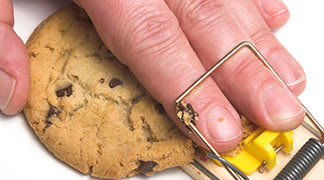
(Last week, we explored our poor eating habits and the some of the options available to us for improving our diets and our overall health. That discussion continues.)
Last, but certainly far from least on the list of foods to avoid are trans fats. I don’t know if anything man-made, as opposed to grown or raised, truly constitutes food to begin with. If you are my age or older, you certainly remember when the “health experts” declared margarine to be far more healthy than butter. Even as early as the 1950s, when we didn’t understand as we do today the ways in which cholesterol is absorbed, margarine manufacturers figured out that they could market their product as healthy.
Well, here we are 60 years later and we know that trans fats such as margarine, hydrogenated oil and shortenings for deep frying are twice as bad for you as saturated fats. And 0% trans fats listed on a label or no trans fats doesn’t mean NO TRANS FATS. Check the label; if you see the word “hydrogenated” in the ingredients, put it back.
It is important to remember that the more processed a food, the less nutritious it is for you. Preserving a food’s shelf life is more important to the manufacturer than making sure you are healthy. Try whenever possible to stick with a plant-based diet, unprocessed foods and when given a choice, always go for what is better for you. It is important to look at what NOT to eat as well as what we NEED to eat. Now the question becomes which types of food to eat, and how much.
We can break down our foods into 3 main categories: carbohydrates, proteins and fats. The latest general recommendation (a good registered dietician can figure your exactly what you need) are for 45% – 65% of the daily food intake to be carbohydrates (that includes whole grains, vegetables and fruits), 10% – 35% protein (preferably plant based, fish, or skinned fowl) and 20% – 35% fats – mostly monounsaturated. What is just as important in order to maintain a healthy weight, while at the same time getting your basic nutrition, is to know how much food to consume on a daily basis. To make this determination, it is necessary to calculate your resting metabolic rate and then factor in the amount of exercise and activity you do daily. A sedentary person is not able to consume as many calories daily as an active person who exercises. Again, a qualified nutritionist or registered dietician can assist you in these calculations.
Food is needed to sustain life. We can take pleasure in eating, and eating meals together as a family is a positive experience, especially in today’s hectic world. It can be one of the key ingredients in leading a healthy and high-quality life into old age, as eating a balanced diet rich in fruits, vegetables and whole grains can extend your years. Consuming the right foods in the proper amounts is another way to “add hours to your days, days to your years, and years to your lives.”
Alan Freishtat is an A.C.E. CERTIFIED PERSONAL TRAINER and a BEHAVIORAL CHANGE and WELLNESS COACH with over 19 years of professional experience. Alan is the creator and director of the “10 Weeks to Health” program for weight loss. He is available for private coaching sessions, consultations, assessments and personalized workout programs both in his office and by telephone and skype. Alan also lectures and gives seminars and workshops. He can be reached at 02-651-8502 or 050-555-7175, or by email at alan@alanfitness.com Check out the his web site –www.alanfitness.com US Line: 516-568-5027.
The words of this author reflect his/her own opinions and do not necessarily represent the official position of the Orthodox Union.

